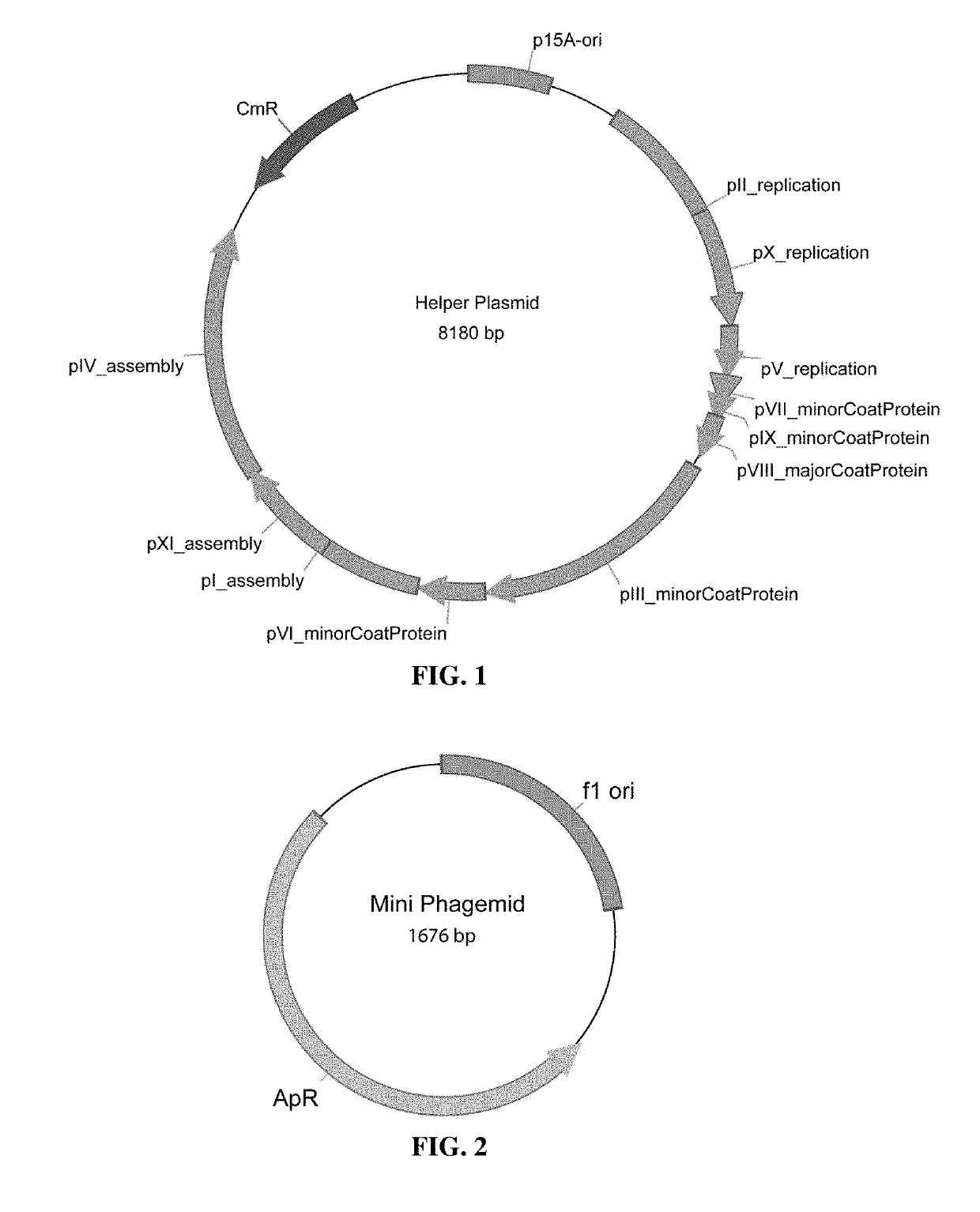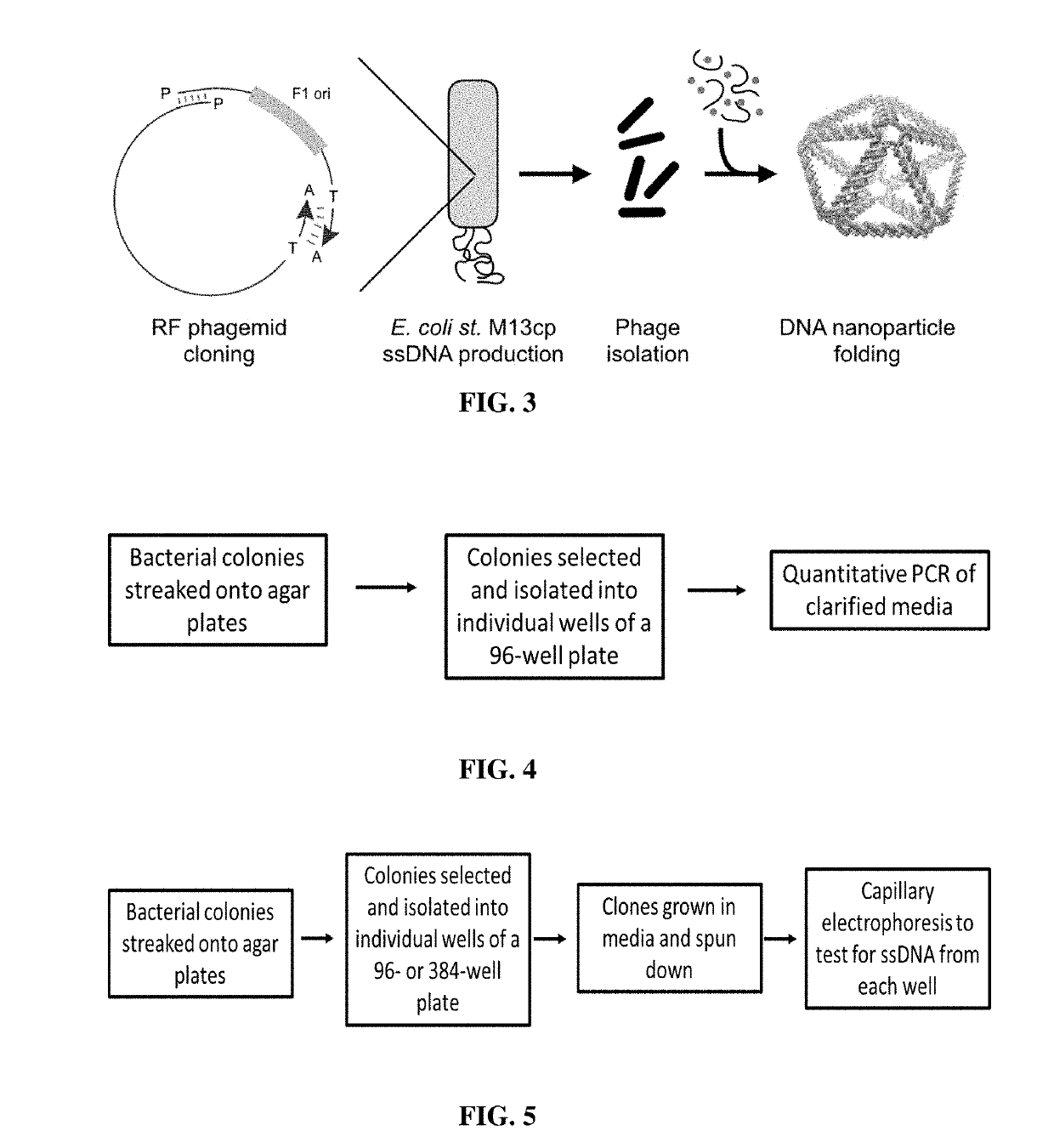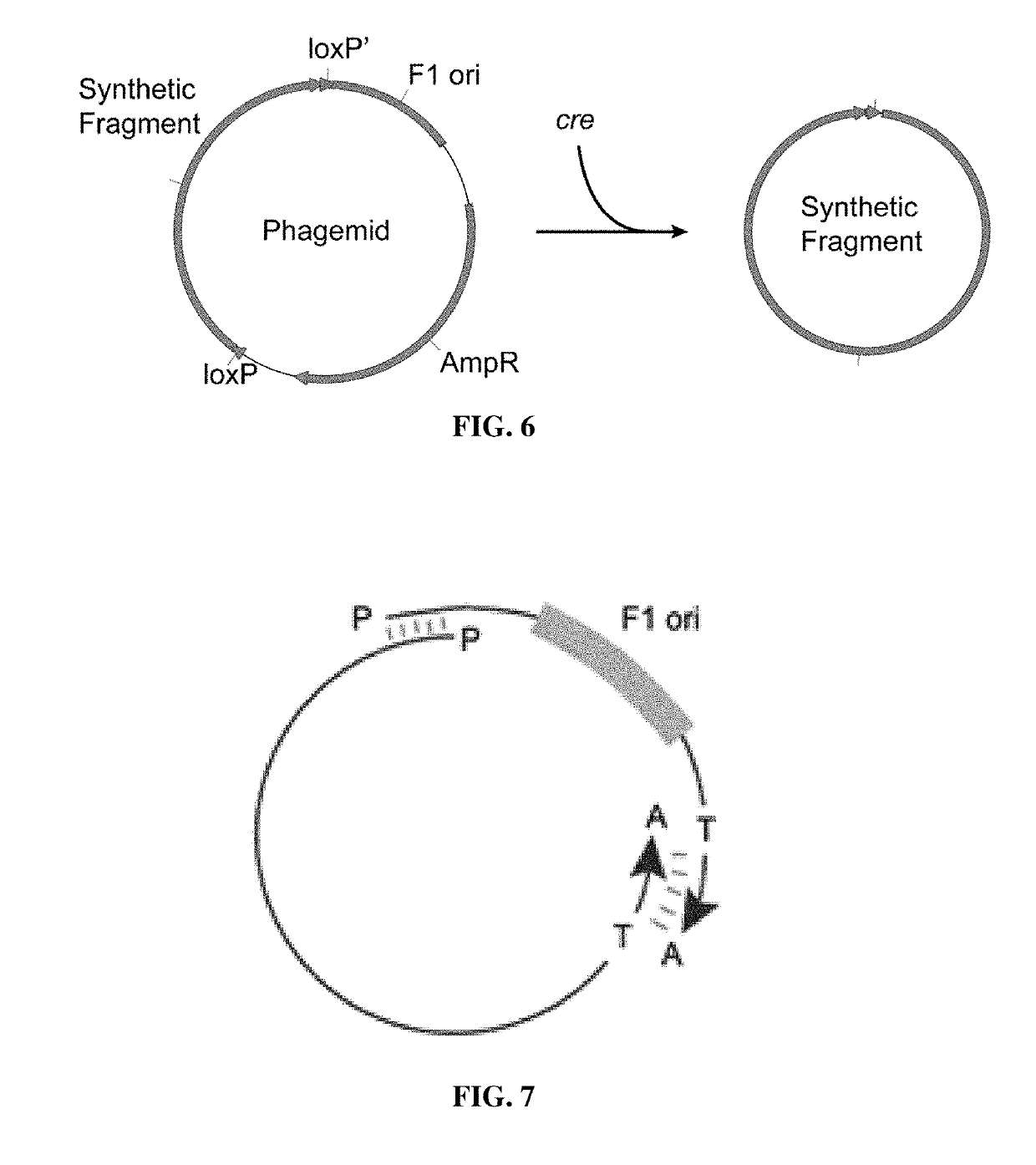Microbial production of pure single stranded nucleic acids
a technology of single stranded nucleic acids and microbial production, which is applied in the direction of viruses/bacteriophages, peptide sources, peptides, etc., can solve the problem that dsdna or other contaminants are not present in sufficient quantity
- Summary
- Abstract
- Description
- Claims
- Application Information
AI Technical Summary
Benefits of technology
Problems solved by technology
Method used
Image
Examples
example 1
ssembly by Single-Stranded DNA
[0299]Methods
[0300]All sequences of primers and templates are provided in Table 1.
TABLE 1Staples for pentagonal bipyramid nanoparticle from pPB52 phagemid.pbip52_1-1293-VTCTCAACAGCGTTTTTGTAAGATCCTAACATGGGGGATTTTTTCATGTAACT(SEQ ID NO: 18)pbip52_1-1520-ETTTTTCTAAAAGTGGGTTACATCGAACTGGACTATTTGTTTA(SEQ ID NO: 19)pbip52_1-1510-ETACATTCAAATGGGTGCACG(SEQ ID NO: 61)pbip52_2-1261-EGCCCCGAAGAGAGCTAACCGCTTTTTTGCACTGAGAGTTTTC(SEQ ID NO: 20)pbip52_2-1251-EACGTTTTCCAAGGACCGAAG(SEQ ID NO: 21)pbip52_3-1088-VGTAAGAGAATTTTTTTATGCAGTGCTCTTACTTCTGATTTTTCAACGATCGGATGATGAGCACTTTTTTTTTAAAGTT(SEQ ID NO: 22)pbip52_3-783-ETCTGCGCTGGCGGATAAAGTTGCAACGGATG(SEQ ID NO: 23)pbip52_3-1096-EGCATGACAACAGAAAAGCATCTTGGACCACT(SEQ ID NO: 24)pbip52_4-880-VCAACGTTGCGCTTTTTAAACTATTAAGACAGATCGCTTTTTTGAGATAGGTG(SEQ ID NO: 25)pbip52_4-1043-EGCGGCCAAGCCATAACCATGAGTGCTGTAGC(SEQ ID NO: 26)pbip52_4-888-EAATGGCAAGTGACACCACGATGCATAACACT(SEQ ID NO: 27)pbip52_5-484-EATCTCATGACCGCTACAGGGCGCCACTTTTCCCTTTTTGAT...
example 2
nt Phage Production
[0307]Methods
[0308]Phage (sPhage) producing colonies, as judged by positive PCR, gel visualization, and sequencing, were grown in 5 mL TB supplemented with glycerol, as recommended by the manufacturer (Sigma-Aldrich, Inc.), inoculated by a single colony from an Luria-Agar plate. The colony was grown in a 15 mL culture tube shaken at 200 RPMs at 37° C. for 36-48 hours. The culture was then spun down in 2 mL centrifuge tubes at 4,000 RPMs for 5 minutes, the supernatant was removed to a fresh tube and spun at 4,000 RPMs for an additional 10 minutes. The supernatant (approximately 5 mL) was refrigerated until ready for DNA preparation.
[0309]SPhage particles containing the f1-origin were precipitated by adding 10% acetate pH 5.2 and 2.5 volumes of 100% ethanol and freezing at −20 C for at least 1 hour, or, alternatively, by adding 6% polyethylene glycol 8000 (PEG 8000) final concentration and shaking at 37 C for 30 minutes. Precipitated sPhage were pelleted by centrifu...
example 3
DNA Containing Only the f1-Origin with a User-Determined Sequence
[0325]Methods
[0326]A nucleic acid sequence was generated by AES encryption of a line from the play “The Crucible” encoding forward paging barcodes, magic filetype barcodes, End Of File barcode, and slack space to fill to 1,100 nucleotides. Primers that overlap in sequence by 20 nucleotides at the end of the ampicillin terminator from the mini f1-Amp plasmid and a complementary primer that overlapped between the terminator and the sequence in the reverse complement orientation. The sequence was amplified with a 50-fold excess of phosphorylated reverse primer and the Amp-to-Crucible forward primer. A second single-stranded DNA was amplified by 50-fold excess of phosphorylated f1 forward primer over the Crucible-to-Amp reverse primer. aPCR was then used to generate these two 1,000-nt ssDNA primers, which were subsequently purified from agarose gel separation. The two primers were mixed in equimolar concentration at 1 ng e...
PUM
| Property | Measurement | Unit |
|---|---|---|
| nucleic acid | aaaaa | aaaaa |
| length | aaaaa | aaaaa |
| size | aaaaa | aaaaa |
Abstract
Description
Claims
Application Information
 Login to View More
Login to View More - R&D
- Intellectual Property
- Life Sciences
- Materials
- Tech Scout
- Unparalleled Data Quality
- Higher Quality Content
- 60% Fewer Hallucinations
Browse by: Latest US Patents, China's latest patents, Technical Efficacy Thesaurus, Application Domain, Technology Topic, Popular Technical Reports.
© 2025 PatSnap. All rights reserved.Legal|Privacy policy|Modern Slavery Act Transparency Statement|Sitemap|About US| Contact US: help@patsnap.com



